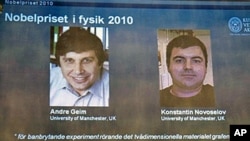Two Russian scientists have won the 2010 Nobel Prize in physics for "groundbreaking" experiments with a strong and highly conductive form of carbon.
Andre Geim and Konstantin Novoselov were recognized for their research on graphene, a type of carbon that is transparent and just one atom thick.
The Royal Swedish Academy of Sciences, which awards the physics prize, said the substance can be used to make "innovative electronics."
It said graphene is suitable for making transparent touch screens and light panels, and can be mixed into plastics that will then conduct electricity without getting too hot.
The 36-year-old Novoselov first worked with 51-year-old Geim as a PhD student in the Netherlands. Both men are now professors at the University of Manchester.
The prize includes a $1.5 million award and a gold medal.
On Monday, the Nobel committee awarded British scientist Robert Edwards this year's Nobel Prize in medicine for his work in developing in-vitro fertilization.
Prizes for chemistry, literature and the Nobel Peace Prize will be announced this week. The final prize, for economics, will be awarded October 11.
Swedish dynamite inventor Alfred Nobel created the prizes, which were first awarded in 1901 in accordance with his will.
Russian Scientists Win Nobel Prize in Physics












